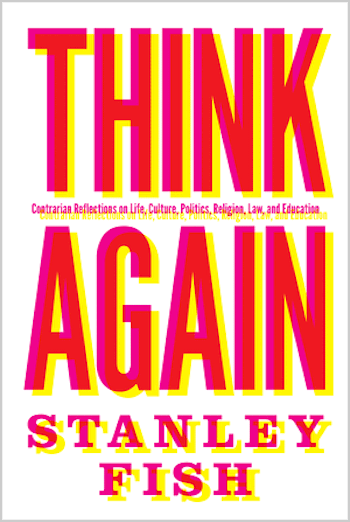Book Review: Stanley Fish Invites Readers to “Think Again” — With Chutzpah
The New York Times columns selected for Think Again are engaging, provocative, maddening, humorous, and insightful.
Think Again: Contrarian Reflections on Life, Culture, Politics, Religion, Law, and Education by Stanley Fish, Princeton University Press, 427 pages, $29.95.
By Robert Israel

Newspaper columnists generally suffer from a shortage of ideas, imagination and spunk. Their work is steeped in mediocrity. They serve up tiresome tirades of predictable verbiage day after sorrowful day.
When these ink-stained wretches run low on their shortages of ideas, imagination, and spunk, they may be tempted to fabricate their sources. Take Mike Barnicle and Patricia Smith, for example, late of the Boston Globe, who did just that. They got caught. They got fired.
Another newspaper columnist — Jeff Jacoby, also of the Boston Globe – also resorted to plagiarism when he ran dry. Unlike Barnicle and Smith, he was suspended (plagiarism is evidently a less punishable offence than fabrication). He returned to the Globe and continues to punish employer and readers alike with an assembly line of rote and wearying columns.
Yet some columnists break the mold.
Take Dana Milbank at the Washington Post. He challenges readers to think and react. His voice is bold and brash, as shown in his recent no-holds-barred counterassault on Donald Trump. Agree or disagree with Milbank, but one thing is certain: he’s got chutzpah.
So does Stanley Fish.
Fish is a prolific author (How to Write a Sentence, There’s No Such Thing as Free Speech, and Is There a Text in This Class? are among his many volumes). He’s skilled at discourse and debate (he a professor of law at Cardozo Law School in New York and at Florida International University). Thankfully, he didn’t advance through the standardizing ranks of a journalistic culture in which editors often reward hard-bitten newspaper reporters with prize columns (or beats) after they’ve toiled in the trenches for years writing obituaries and such. Fish is a news organization outsider, which is probably why the New York Times invited him to write on whatever subjects struck his fancy. Between 1995 and 2013 (he recently discontinued the feature), his “contrarian” columns appeared under the “Think Again” banner. He aggravated legions of Times readers, and won accolades from many others.
In Think Again, he has selected 100 of these Times columns. They are engaging, provocative, maddening, humorous, and insightful.
“Readers will learn about my anxieties, my aspirations, my eccentricities, my foibles, my father, my obsessions, Frank Sinatra, Ted Williams, basketball, and Jews,” Fish writes in the introduction.
I tend to squirm when I read columnists who devote space and ink to navel gazing. I believe columnists should avoid writing about themselves: they are not nearly as interesting as the people they are assigned to write about. Yet many of Fish’s autobiographical pieces, many found in the first part of his book, are compelling because he accentuates the universality of his subjects. In “Max the Plumber,” he etches an indelible portrait of his father, a Polish Jewish immigrant, who arrived in the States at age 16:
My father told the story of his last night in Europe (he was to sail for America the next day). A week or so before, a gang of anti-Semitic toughs had surrounded my father and his brother and beat them up. That night he went out alone, carrying a stick the size of a baseball bat. He found one of his tormentors and cornered him in an alley….[he said] ‘When I left him, I didn’t know if he was dead or alive.’
While Fish is a disciplined writer, his academic training sometimes plays havoc with his prose, which from time to time plunges into some pretty murky depths. Though his more arcane pieces might appeal to academic-minded readers, they lack the often-mischievous spirit that adds welcome spice and sass in his other columns.

Stanley Fish — an acute observer of popular culture.
Fish could obviously have chosen any number of career paths. His grasp of legal, political, and religious issues is impressive. In particular, he is an astute observer of popular culture, to the point that he would have made a superb film critic given his encyclopedic knowledge of movies and insightful analysis of their significance. His pieces on filmmakers Joel and Ethan Coen, actress Kim Novack, and actor Charlton Heston are enjoyable must-reads.
One of the shortcomings of this volume is that, though Fish quotes several reader responses to his work in his book, it could have benefited from hearing more from his critics. He writes that reader reactions “energized” him; Fish seemed to revel in the intellectual fisticuffs of point-counterpoint. But we don’t have enough evidence of that muscular give-and-take in Think Again.
Overall, Fish stands as a substantial exception in a shallow time — he is a generous and sagacious columnist. His insights on a wide range of issues are leavened with an ample supply of compassion and humor. He ought to consider returning to the newspaper fray, if only to provide other columnists with an example of commentary worth writing … and reading.
Robert Israel writes about theater, travel, and the arts, and is a member of Independent Reviewers of New England (IRNE). He can be reached at risrael_97@yahoo.com.
Tagged: Contrarian Reflections on Life, Culture, education, Law, New York Times column, politics, Princeton University Press, religion, Stanley Fish
